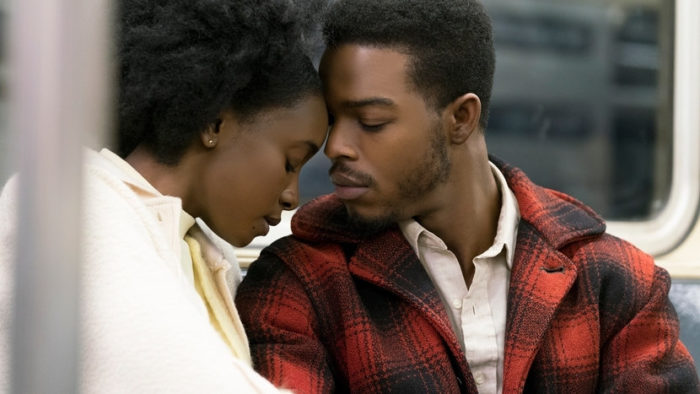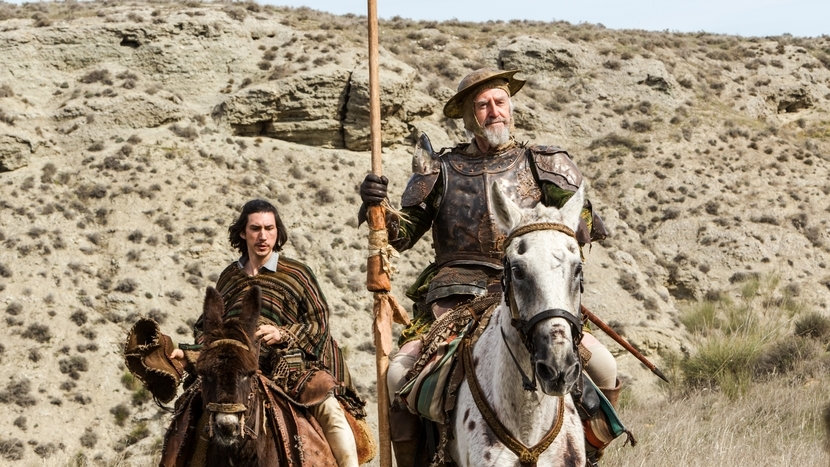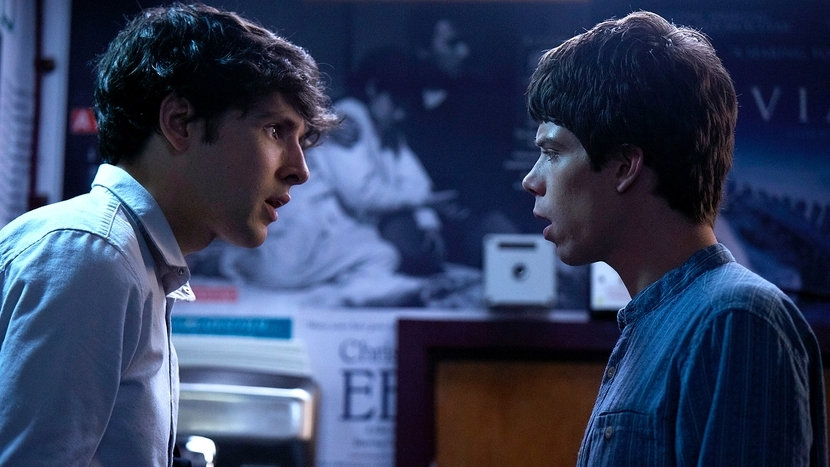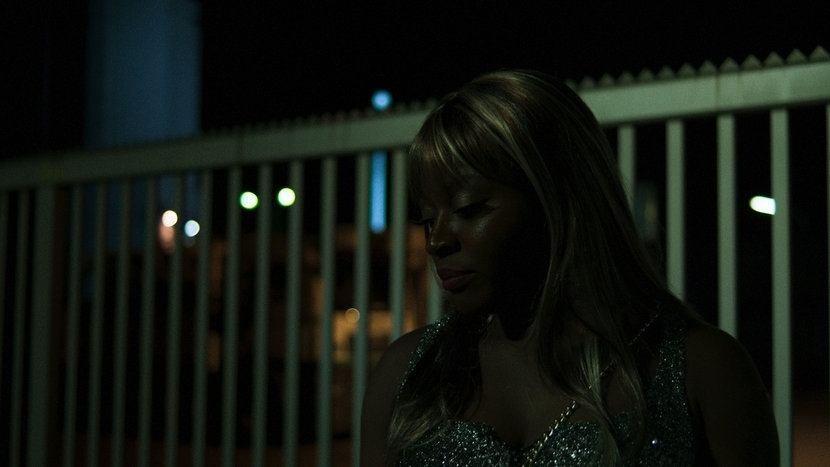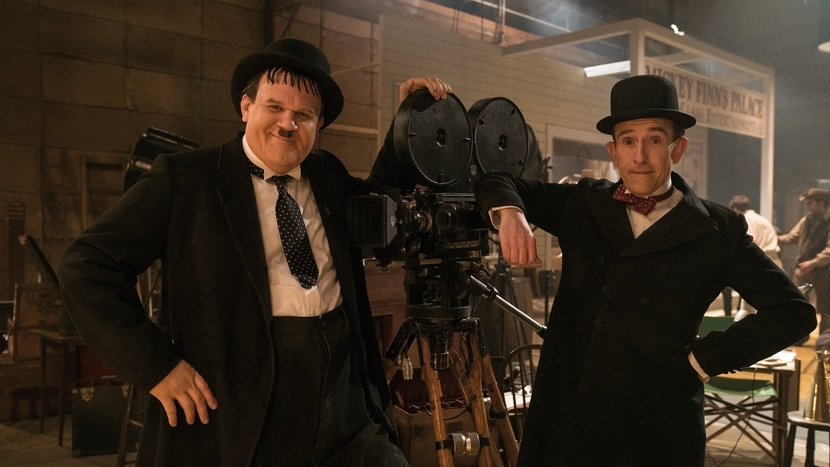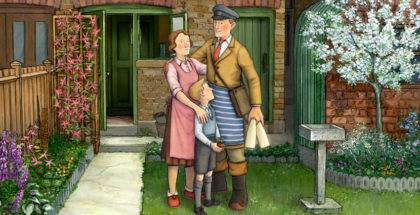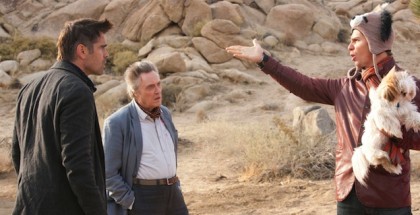LFF 2018 film reviews: Yours in Sisterhood, The Man Who Killed Don Quixote, If Beale Street Could Talk, Only You, Stan & Ollie, Benjamin, Shadow, Joy
David Farnor | On 21, Oct 2018
From Netflix’s Outlaw King, Roma and The Ballad of Buster Scruggs to Amazon’s Life Itself and Suspiria, the big VOD players are all rolling into town for the London Film Festival this October. We head to Leicester Square to round up the highlights from this year’s event:
Yours in Sisterhood
It’d be nice to say that society has made a lot of progress in the last 40 years in terms of gender equality, but the truth is that there is still a long way to go. Yours in Sisterhood demonstrates that elegantly and eloquently, as it gets a group of women to read out letters sent to Ms., the USA’s first mainstream feminist magazine. Posted in the 1970s, the modern women reflect on the stories they read aloud, as well as compare them to their own experiences, and the similarities that exist are appalling – from male-dominated careers where women aren’t hired to the expectation placed upon women to deal with domestic duties. It’s a powerfully simple device and director Irene Lusztig gets her diverse array of participants to speak to the camera as they give a voice to these vital forgotten narratives from our own past – a direct address to the present that challenges us to do better. It’s only halfway through that we realise the infuriating reality twice over: the letters were sent to the magazine, but they were never published.
Yours in Sisterhood is available now to watch online on MUBI UK, as part of a £7.99 monthly subscription.
The Man Who Killed Don Quixote
It’s been the best part of three decades since Terry Gilliam first started to adapt Don Quixote for the screen – a process of doomed productions and legal battles that was partly captured on screen in the 2002 documentary Lost in La Mancha. Now, he’s finally finished his take on Miguel de Cervantes’ novel, and there’s some satisfaction in seeing the persistent director realise his vision. It’s a shame, then, that it’s a vision 30 years out of step. The movie begins with a painfully apt false start, as Gilliam and co-writer Tony Grisoni introduces us to director Tony (Adam Driver) who is struggling with his own version of Cervantes’ book. The meta-framework he’s given is pleasingly self-aware, but it’s also populated with dire female characters who behave like someone’s dated idea of how women might act, rather than actual human beings. Such two-dimensional, sexist stereotypes are inexcusable in 2018, but they’re unforgivable from a film that’s had nothing but time to be read and rewritten. The movie’s saving grace, fittingly, is Jonathan Pryce’s Don Quixote (or, rather, an actor who thinks he’s Don Quixote), who is magnificent as the confused, dim-witted but kind-hearted old fool – when he and Gilliam are at full tilt, there’s gold in them windmills, as worlds and objects collide in a fantastical farce. But when the real part of a surreal dreamscape doesn’t convince, it’s hard to go along with the silliness. Yes, it’s satisfying to see Gillian still going at it after all these years, but that satisfaction comes with an equal dose of disappointment.
The Man Who Killed Don Quixote is currently seeking a UK distributor.
If Beale Street Could Talk
It’s hard to know what happened in this world to give us Barry Jenkins, but you’ll be glad it did when you see the Moonlight director’s latest. He brings the writing of James Baldwin to the screen for the tale of Tish (KiKi Layne) and Fonny (Stephan James), two childhood friends who find their familiar affection blossom into full-blown love. But when Fonny is accused of rape, and Tish becomes pregnant, the duo find themselves facing a wall of prejudice and injustice, from both Fonny’s disapproving family and the legal system. While there are tough times and hard knocks aplenty, though, what amazes about Beale Street is the way that Jenkins’ script focuses on the beauty of their relationship, on the poetry of Baldwin’s language, and on the triumph of love in the face of hate. It’s a graceful, gorgeously filmed romance that balances the authentic discrimination of 1970s America with a ravishing colour palette, tender performances and a timeless tribute to the power of dignity and respect.
If Beale Street Could Talk will be released in UK cinemas on 8th February 2019.
Only You
Between God’s Own Country and Victoria, Josh O’Connor and Laia Costa have proven themselves two of the most exciting, engaging young actors of modern cinema. Bringing them together, then, is something of a masterstroke, as they play young hopeful Jake with not-as-young-as-she-claims-to-be Elena. The pair cross paths on New Year’s Even in Glasgow, and their paths don’t uncross for months, whisking them off into a rapidly-developing relationship. But things aren’t simple for the duo, as they find themselves struggling to conceive a baby, taking this tale into very serious territory. It’s hard to believe the speed at which their romance moves from sex to wanting to start a family, but O’Connor and Costa are electric, and their performances (both together and individually) manage to sell the emotional journey they undergo. Harry Wootlliff, meanwhile, directs her lead couple with a beautiful eye, compelling intimacy and earnest intensity.
Only You will be released in UK cinemas in 2019.
Benjamin
Simon Amstell impressed with his directorial debut, Carnage, a mockumentary about veganism that premiered on BBC iPlayer. Now, he takes on more conventional fare with this comedy-drama about a young filmmaker trying to make his second movie. While a vaguely autobiographical indie featuring romance and artistic dilemmas does sound conventional, though, Amstell’s unconventionally candid in his portrait of a troubled 20-something: the eponymous director, played by Colin Morgan, is a bundle of neuroses, experiencing not just a professional crisis but an existential one, leading him to spend half his time locked up in his flat alone watching YouTube videos of a monk. Crossing paths with musician Noah (Phénix Brossard) takes Benjamin from philosophical dread to swooning affection, and it’s in the intersection of these things that Amstell finds raw humour, crafting something hilariously awkward, amusing painful and profoundly tragic from the pit of one man’s inner despair – a whirlwind of laughter and sadness that’s caustic, sweet and wonderfully quotable. Roll on a third film, please.
Benjamin will be distributed in the UK by Signature Entertainment at a future date.
Shadow
After Matt Damon misstep The Great Wall, Zhang Yimou returns to form with Shadow, a stunningly beautiful martial arts epic that sees the master doing what he does best: crafting breathtaking action set pieces. He and co-writer Wei Li take us into a world of doubles and deception, as we witness the war between neighbouring kingdoms Pei and Jing, one that’s led to the most important people in each city having their own decoys to protect their lives. These surrogate doubles (Shadows) are deployed as weapons by their masters, and by themselves in their own right, weaving a ying-yang tapestry of fate and identity that plays out like Face Off meets Infernal Affairs. Kings, commanders, sisters and soldiers all collide and cross each other in a complex dance that is matched perfectly by creative cinematography, which uses water as a recurring symbol and layers of translucent wall panels to send half the screen into black-and-white and the other half in eye-popping colour. The plots a load of balderdash, but the visuals are jaw-dropping and it builds impeccably up to an incredible sequence that involves the innovative use of metallic umbrellas to deadly, gripping effect. What a joy it is to see a master at work.
Shadow is currently seeking a UK distributor.
Joy
Joy is a film that doesn’t live up to its title, which comes not from the feeling of happiness but from the name of its protagonist. Played by Joy Alphonsus with a resilient strength, she’s a sex worker who has moved from Nigeria to Austria, but the price of her escape to Europe is having to pay off her debt to “Madame”, until she’s allowed a passport and to find her own way. It’s brutal, cruel environment, one that she shares with several other women in a dorm that doubles as a brothel, with Madame ruling over them with the threat of bad juju, should they go against her and break the oath they took back on home soil. The arrival of Precious (Mariam Precious) sends Joy’s arduous journey towards freedom into disarray, and we feel every burst of pain, stab of hope, pang of frustration and blow of exploitation that greets both women. Director Sudabeh Mortezai assembles an immersive, horrible world that offers a powerful glimpse of inner strength, even as it rails with anger at the devastating conditions Joy has to endure. The (mis)treatment of sex workers is an urgent, important topic for society to try and end or improve, and Joy highlights it with the immediacy of a documentary and the humanity of a remarkable, assured filmmaker.
Joy is currently seeking a UK distributor.
Stan & Ollie
Steve Coogan and John C. Reilly. Any film that brings the two together is a promising one – but that’s even more so when the two are playing Stan Laurel and Oliver Hardy. Stan & Ollie catches up with the comedy legends not in their prime but after their careers have peaked, as they go on a tour of British towns and music halls, while hoping to scrape together the financing for another motion picture. Coogan and Reilly are impeccable as the legendary double-act, the former hiding a prickly selfishness behind the boyish smile and innocently raised eyebrows, the latter sullenly under-appreciated as the gurning and grumping straight man. Their less-than-funny real life situation is wonderfully observed by Jeff Pope’s script, which takes slapstick stunts like suitcases going downstairs and bread rolls being thrown and turns them into melancholic beats of frustration. When they’re on-stage, though, the duo kindle the flames of an iconic comedy partnership, sparkling with wit, pinpoint physical timing and a carefree familiarity. There are laughs in their interactions with slippery producer Bernard Delfont (Rufus Jones), as he books them into tiny theatres with small crowds, and howls in their dealings with wives Lucille (Shirley Henderson) and Ida (Nina Arianda) – a double act in their own right – but it’s the affection between two old friends, which is both shaped by and expressed through their skits and dances, that warms your heart. The sight of them dancing together on stage will have you welling up with tears by the end – you can see the weight of the world shrug off their shoulders once they step into their personas, and it’s that delicate shift, in poise, in performance and in philosophical outlook that Stan & Ollie captures so winningly. It’s the magic of entertainment, pure and simple.
Stan & Ollie will be released in UK cinemas on 11th January 2019.


